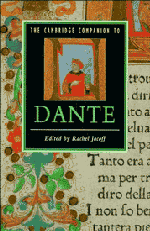Book contents
- Frontmatter
- 1 Life of Dante
- 2 Dante and the lyric past
- 3 Approaching the Vita nuova
- 4 The unfinished author
- 5 Dante and the empire
- 6 Dante and Florence
- 7 Dante and the classical poets
- 8 Dante and the Bible
- 9 The theology of Dante
- 10 A poetics of chaos and harmony
- 11 Introduction to Inferno
- 12 Introduction to Purgatorio
- 13 "Shadowy prefaces"
- 14 Dante and his commentators
- 15 Dante in English
- Further reading
- Index
3 - Approaching the Vita nuova
Published online by Cambridge University Press: 28 May 2006
- Frontmatter
- 1 Life of Dante
- 2 Dante and the lyric past
- 3 Approaching the Vita nuova
- 4 The unfinished author
- 5 Dante and the empire
- 6 Dante and Florence
- 7 Dante and the classical poets
- 8 Dante and the Bible
- 9 The theology of Dante
- 10 A poetics of chaos and harmony
- 11 Introduction to Inferno
- 12 Introduction to Purgatorio
- 13 "Shadowy prefaces"
- 14 Dante and his commentators
- 15 Dante in English
- Further reading
- Index
Summary
DANTE'S FIRST BOOK (his libello, or “little book,” as he calls it), marks the beginning of a tendency that will dominate his literary career as a whole – the tendency to edit the self. All of Dante's major works – the Vita nuova, the Convivio, the De vulgari eloquentia, and of course the Divina Commedia – share this pattern of self-commentary on the part of an author who, for some reason, was never content merely to write poetry, but who also felt the need to instruct his reader about how that poetry came into being and how it should be read. Dante's work has been taken seriously by his readers over the centuries, to be sure, but it is fair to say that no one has ever taken it more seriously than the author himself.
The most striking aspect of the Vita nuova, for those who do not merely take its canonical stature for granted, or whose perception of the work is not mystified by the fact of its authorship, is the utter seriousness with which the author sets out to dignify and solemnify the rather innocent (and often mediocre) lyric poems that he composed in his youth.
- Type
- Chapter
- Information
- The Cambridge Companion to Dante , pp. 34 - 44Publisher: Cambridge University PressPrint publication year: 1993

